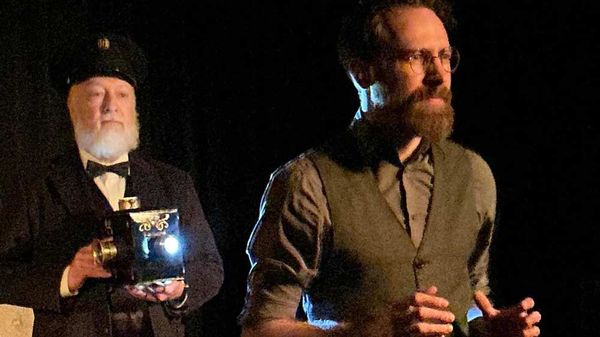
October 12, 2018
David Bowie: Loving The Alien (1983-1988)
Kevin Schattenkirk READ TIME: 7 MIN.
The fourth box set in a series, "Loving the Alien (1983-1988)" consolidates an era of David Bowie's work that was commercially successful but often regarded as artistically problematic. Like its predecessors, this box set is generous and insightful in its offerings, spread over the course several discs. Included here are Bowie's three studio albums of the era with remastered sound ("Let's Dance," "Tonight" and "Never Let Me Down"), two live albums ("Serious Moonlight (Live '83)" and "Glass Spider (Live Montreal '87)"), two compilations of remixes and non-album tracks ("Dance" and "Re:Call 4") and "Never Let Me Down 2018," an entirely redone version of the original 1987 album.
"Let's Dance" (1983) was wildly successful, spawning three of Bowie's most well-known singles in the title track, "Modern Love," and "China Girl" (an Iggy Pop cover that Bowie also co-wrote). The album was produced by legendary Chic guitarist Nile Rodgers, an ubiquitous hitmaker of the era who took heed of Bowie's instruction "to do what I did best - 'Nile, I really want you to make hits.'" But the success of "Let's Dance" was not comfortable for Bowie – particularly the expectations that (1) he should follow up the album with more of the same, and (2) become a greatest hits concert act, which thoroughly went against his artistic grain.
The follow up, "Tonight" (1984), moves slightly away from the funk-pop of its predecessor, incorporating elements of reggae, stabs at modern rock, but with prominent synths and horns. While not necessarily a bad album per se (well...with the exception of an unseemly cover of the Beach Boys' "God Only Knows"), "Tonight" initially sounds like artistically stagnant product. In considering his new image of widespread appeal, Bowie sanded the edges off his work. The title track is another Iggy Pop cover, a song from the perspective of an addict watching his lover die of a heroin overdose - explained in the spoken word introduction of Pop's version, but excised from Bowie's. Also, the simply gorgeous "Loving the Alien," a song about religious tolerance and Islamophobia, is over-produced to adult contemporary standards (the definitive version would later appear on his 2010 live album "A Reality Tour"). Nicholas Pegg, an authority on Bowie's work, observed that in the mid-1980s, Bowie sounded of the times rather than ahead of the curve and sidestepping trends. "Tonight" is proof of this. It might've made a nice album for Bowie offspring like Culture Club, but it doesn't sit well in his own catalogue.
Following "Tonight" is Bowie's most critically maligned album, "Never Let Me Down" (1987). Not even Bowie spared the album, often voicing regret for how it turned out. While it would become his biggest selling album at that time, he would perform none of its songs live after 1987. This is somewhat perplexing, as Bowie never shied away from re-framing his own songs. He had suggested on numerous occasions that the problem wasn't with his songwriting, but rather his disinterest in the recording process. This has remained the most under-appreciated album in the Bowie canon: Beneath the dated '80s production aesthetic lies a collection of songs proving he was still capable of good writing. To underscore my point, Bowie included a revamped version of the album's "Time Will Crawl" on his 2008 compilation "iSelect." Bowie teamed with engineer Mario McNulty to re-tool the song – keeping the original vocals, acoustic guitars and a key piano melody, removing excessive synths, adding a string quartet and a new drum track. Discussing the new "Time Will Crawl" in the liner notes for "iSelect," Bowie states of "Never Let Me Down," "Oh, to redo the rest of that album." And that is what McNulty has done here.
For "Never Let Me Down 2018," Bowie's original vocal tracks remain (which obviously could not be re-recorded), as do important instrumental parts – the piano in "Time Will Crawl," the harmonica in the title track, and the sitar in "Zeroes," among others. Otherwise, McNulty collaborated with the musicians to re-imagine their parts for each song. Allowing musicians such expressive freedom is in keeping with Bowie's usual methodology. Many of the musicians here worked extensively with the artist, especially in the last couple decades of his life – drummer Sterling Campbell, guitarists Reeves Gabrels and David Torn. Bassist Tim Lefebvre (from Bowie's farewell masterpiece "Blackstar") joins, as does string quartet arranger Nico Muhly. Bowie's friend Laurie Anderson provides spoken word on "Shining Star (Makin' My Love)." Overall, their contributions underscore what guitarist Carlos Alomar (who co-wrote the title track, by the way) describes as "the innovation of Bowie."
The original album's reliance on synths is dramatically scaled back here, replaced by Muhly's string quartet arrangements, which veer nicely toward the experimental and provide new color to songs such as "Time Will Crawl," "Beat of Your Drum," and, most notably, on a cover of Iggy Pop's "Bang Bang." Rock tracks such as "'87 and Cry" and "New York's In Love" rattle their cages a bit more than on their original versions, especially on the latter where chaotic programming is replaced by Campbell's live drum track. "Zeroes" absolutely shines as the George Harrison-esque Brit-pop number it always was. It's also one of Bowie's most highly referential songs ("And me, my little red corvette has driven by"), his brilliant use of wit to cushion the question of artistic (ir)relevance ("Tomorrow is back claiming redemption is on your heels, and a toothless past is asking you how it feels").
"Glass Spider," the album's lone art-rock piece and perhaps the most mistreated in 1987, becomes a fully realized masterpiece and positively shines. With squalling guitars (courtesy of Gabrels), electronic and live drums, the haunting soundscape recalls Bowie's 1995 album "1. Outside." Another significant makeover, the faceless funk of "Shining Star (Makin' My Love)" becomes a hybrid of soul, funk, doo-wop vocals, and avant-garde rock in its new incarnation. Anderson's spoken word section replaces the out-of-nowhere rap from actor Mickey Rourke in the original 1987 version. Only the title track suffers from reinvention. Where the original 1987 version is an ebullient slice of pop, the new version is much more subdued. It's certainly well-executed and provides a moment of respite, even if the pure joy of the original was perfectly fine as-is.
But why so much focus on "Never Let Me Down" here? Its presence looms over this box set, inviting us to compare and contrast the original and re-imagined albums, the plethora of live versions of these songs (seven of which are on "Glass Spider (Live Montreal '87)" album), as well as remixes, extended versions and single edits (presented on the "Dance" and "Re:Call 4" discs). It's as if Bowie believed in the songs even if he couldn't find the right way to present them. The biggest revelation is that Bowie's songwriting was still in top – if not peak – form, and "Never Let Me Down 2018" proves this in spades.
Of the other discs in the set, the live albums "Serious Moonlight (Live '83)" and "Glass Spider (Live Montreal '87)" document Bowie's strength as a live performer. Throughout his career, Bowie managed to avoid becoming a greatest hits act, carefully drawing from his vast back catalogue to complement his newest work, rearranging songs where appropriate. With "Serious Moonlight (Live '83)," older songs such as "What in the World," "Breaking Glass," "Cracked Actor" and "Station to Station" appear as somewhat odd musical bedfellows with his then-current "Let's Dance" material, which was rooted largely in R&B and funk. But with slightly-retooled arrangements, the older songs work alongside hits such as "Let's Dance," "Modern Love," and "China Girl."
Unlike the Serious Moonlight tour, the Glass Spider tour was much more theatrical, with sets, dancers and dialogue. But only in a few instances (such as the opening track "Up the Hill Backwards") does the absence of visuals hinder the listening experience. Otherwise, "Glass Spider (Live Montreal '87)" is another testament to Bowie as a live performer. The songs from "Never Let Me Down" performed here are looser than their studio versions. Included in the set are stellar performances of older album tracks such as "Time," "Big Brother," and "Sons of the Silent Age" (a particular highlight, with tour guitarist Peter Frampton singing the chorus sections).
Of the remaining discs, "Dance" collects extended, remixed, and dance mix versions of songs from the three studio albums, particularly the better songs from "Tonight" (which, for my money, is Bowie's least interesting album). Among the best, the extended version of "Blue Jean" highlights Eddie Cochran's influence, and the reggae of "Don't Look Down" is given some room to breathe.
The final disc, "Re:Call 4" collects single edits, soundtrack songs, non-album tracks and single B-sides – including all of Bowie's tracks from "Labyrinth" and "Absolute Beginners," films in which he also starred. The full length version of "Absolute Beginners," one of his very best '80s singles, is included here. "When the Wind Blows" (from the film of the same name) is an edgy, midtempo slice of modern rock. Two songs recorded during the "Never Let Me Down" sessions, "Julie" and "Girls," were ultimately released as non-album single B-sides. An uptempo jangle-pop song, "Julie" could have been a viable A-side. And "Girls," originally written for and released by Tina Turner in 1986 on her "Break Every Rule" album, is prime Bowie art-rock, a slow burner that builds to a dramatic midsection.
Included in the 15-disc vinyl LP box is an 88-page hardback book. The CD box contains 11 discs and a 128-page hardback book (and the digital format contains just the music). The book included in the LP and CD box sets contains a plethora of never-before-seen photos, a variety of press interviews, and notes from album producers Nile Rodgers ("Let's Dance"), Hugh Padgham ("Tonight"), and Mario McNulty ("Never Let Me Down 2018").
As with the three preceding box sets, "Loving the Alien (1983-1988)" is extensive and provides insight into Bowie's work at a crucial time in his career. These five short years found Bowie achieving great commercial success, and quickly realizing what such success might cost his larger artistic vision. To this extent, "Loving the Alien (1983-1988)" also serves as a fascinating portrait of Bowie on the verge of yet another artistic reinvention (a side note: it will be interesting to see how the Tin Machine years are treated, if at all, in the next box set). And though some of Bowie's material between 1983-1988 can be frustrating, it's an era of his work that has long deserved critical re-evaluation.
"Loving the Alien (1983-1988)"
by David Bowie
$149.98 (CD box set) and $279.98 (vinyl LP box set)
https://store.davidbowie.com/
Kevin Schattenkirk is an ethnomusicologist and pop music aficionado.







